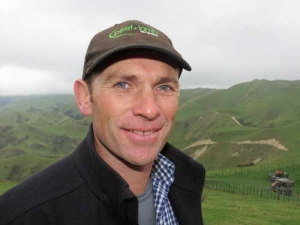Red meat rebound
The red meat sector is poised for a strong rebound this season, with export receipts forecast to top $10 billion and farm profitability to almost double.
 Beef + Lamb chairman James Parsons says farmers want an organisation to represent their interests and one that provides them with clear demonstrable value.
Beef + Lamb chairman James Parsons says farmers want an organisation to represent their interests and one that provides them with clear demonstrable value.
The 2015 sheep and beef levy referendum has ended showing apathetic voter turnout – around the same number as last voted six years ago.
As at 10am last Thursday, 6296 farmers had cast their votes, representing only 37% of the voting papers sent out; the previous referendum in 2006 recorded a 39% turnout.
Voting ended at 5pm on Thursday; a strong ‘yes’ vote was on the cards.
Under the Commodity Levies Act 1990 Beef + Lamb NZ is required to ask sheepmeat and beef producers (including dairy farmers through their cull cows) if they wish to continue funding activities and programmes for six years from 2016-22.
The current sheep and beef levy orders (the mechanism that allows a levy to be collected) run out in February 2016.
At least 50% of voting farmers, by both number voting (‘one farmer, one vote’), and their number of stock units (weighted vote), need to support continuing a levy for a new levy order to be approved.
BLNZ held farmer meetings throughout the country to explain what the industry-good organisation is planning
Chairman James Parsons says while each region has its own issues and climatic challenges, common themes have consistently been raised in discussions.
“Overwhelmingly farmers have said they want an organisation to represent their interests, but importantly one that provides them with clear demonstrable value,” he says.
One area of common interest is the market access work. Farmers seem united in the need for BLNZ to work on their behalf alongside the Government to ensure the best trade arrangements for farmers and ultimately that all tariffs are eliminated.
Last year this work saved $161 million that would otherwise have gone on tariffs if free trade agreements like those with China and Taiwan had not been in place, Parsons says.
“There is a lot of interest in the potential for our sector through the Trans Pacific Partnership and we fully support the Government’s insistence that we must strike a high quality deal.
“Some farmers have voiced disquiet at the possibility the deal could weaken New Zealand’s sovereignty, but there was widespread acknowledgment that NZ producers must remain competitive and be a part of the deal if it is to progress."
Voting has started for the renewal of DairyNZ's milksolids levy.
The most successful catchment groups in NZ are those that have 'a source to sea' approach.
Associate Agriculture Minister and Manawatu dairy farmer Andrew Hoggard says the free trade agreement (FTA) negotiated with India is not a bad deal and his party, Act, will support it when it goes before Parliament.
Newly released data from Environment Canterbury (ECan) Farm Environment Plan (FEP) audits are showing a dramatic lift in environmental performance across the region.
A solid recovery of global dairy prices this year makes a $9.50/kgMS milk price almost a shoo-in for this season.
As New Zealand marks the United Nations’ International Year of the Woman Farmer 2026 (IYWF 2026), industry leaders are challenging the misconception that women only support farming.

OPINION: Here w go: the election date is set for November 7 and the politicians are out of the gate…
OPINION: ECan data was released a few days ago showing Canterbury farmers have made “giant strides on environmental performance”.